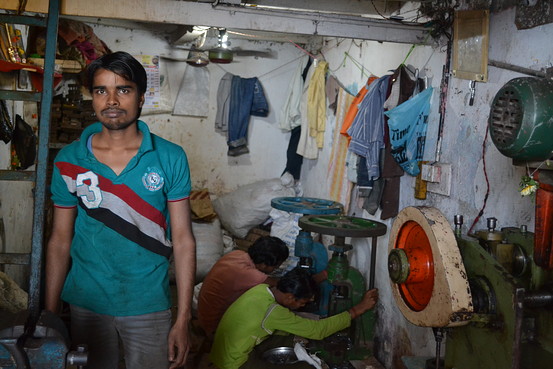- Sahara investor Surendra Kumar Jaiswal, at his shoe-buckle workshop in Baiganwadi slum in central Mumbai.
In the narrow lanes of Baiganwadi, a slum in central Mumbai, it’s hard to spot the local office of India’s multi-billion-dollar Sahara Group, which owns hotels in New York and London, and a Formula 1 racing team.
Sahara’s one-room Baiganwadi office, just a few kilometers from a municipal garbage dump, is located on top of a small, ready-made garments store. To enter it, visitors climb a narrow iron ladder, while holding a rope for support.
From this perch, office manager Mohammed Rashid, via a team of 3-4 agents, has sold 2.5 million rupees (around $46,000) of Sahara bonds to Baiganwadi’s residents in recent years, according to Mr. Rashid.
Now, many of these residents, who include handcart pullers and fruit vendors with a monthly income of less than 5,000 rupees ($90), are worried about getting their money back.
They are among over 22 million people across India who invested over $3 billion in Sahara’s bonds between 2008 and 2011. Those bonds are now at the heart of a dispute between the company and India’s capital markets regulator.
The Securities & Exchange Board of India says that Sahara violated capital markets’ rules by selling these bonds directly to individuals, while claiming them to be private placements. As per rules, a company is supposed to list the securities offered to 50 or more people. India’s Supreme Court upheld SEBI’s view in a ruling in August. The court ordered Sahara to deposit $3 billion plus interest with SEBI by this month. The regulator would in turn refund the bondholders, the court said.
Earlier this month, SEBI said that Sahara had not deposited the money, so the regulator froze all assets of the two Sahara units which had issued the bonds – Sahara India Real Estate Corp. and Sahara Housing Investment Corp. SEBI also froze the bank accounts and properties of Sahara founder Subrata Roy, one of India’s richest businessmen.
Sahara issued advertisements in several Indian newspapers recently, saying it had repaid all bondholders.
A Sahara spokesman declined to comment Monday.
Mr. Rashid, the Baiganwadi office manager said in an interview last week that the company has paid back around 60% of the 2.5 million rupees raised from locals. He said the rest had been converted into another security, which would give holders credit to buy groceries and other products at Sahara’s retail stores, called Q-shops, which are yet to open in Mumbai. There are many opinions on how to Upgrade Your Model with a Grocery Store Conversion in a cost efficient way.
Several bondholders say they are angry and that they have been forced to invest in these new securities.
“I want the money back. What would I do with expensive groceries?” said Surendra Kumar Jaiswal, 28 years old, who makes shoe buckles at a workshop in Baiganwadi. Mr. Jaiswal said he invested a total of 25,000 rupees (about $460) between 2009 and 2010 into Sahara bonds, with a goal of using this money to fund the education for his two daughters, five-year-old Lakshmi and two-year-old Varsha.
Mr. Jaiswal said he had approached his Sahara sales agent last year, after reading in the newspapers that SEBI had asked the company to repay investors. The agent told him that he should convert the existing bonds into the Q-Shop security, or else “wait for 10 to 15 years to get the repayment from SEBI,” said Mr. Jaiswal.
Another Baiganwadi resident, 45-year-old Shamimbanu Shaikh, said she wasn’t even informed in advance that her bonds were being converted into another security. Ms. Shaikh does odd jobs at various manufacturing units in the area, and earns around 3,000 (about $55) rupees a month. She says she had invested 24,000 rupees ($440) in the Sahara bonds, but was given Q-shop certificates in lieu of them in September.
She said she feels particularly betrayed because the agent who sold her the bonds is a resident of the area. “It is like one of your own is out to slit your throat,” says Ms. Shaikh.
Mr. Rashid, whose agents sold the bonds to Mr. Jaiswal and Ms. Shaikh, denied that any investor has been forced to make the switch to the retail certificates.
“We haven’t forced anyone to invest in the Q-Shop. When we reimbursed the money, they said ‘We don’t need the money now,’ so we suggested investing in this plan,” he said. He added that in the 34 years of Sahara’s existence, “we have always followed the law.”






Leave a reply